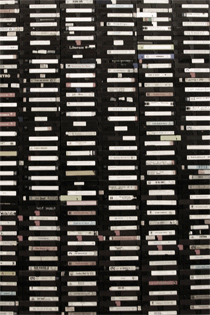| 15.09.2015
A new MOOC (Massive Open Online Course) starting from 21st of September 2015 invites students to explore how geography, cartography, urbanization and spatial justice play a role in shaping the notion of human space. How do we understand the notion of space? How have urbanisation, mobility, digital spaces, and globalization changed the way we perceive [...]
Denis Retaillé | 14.09.2015
Ritornellos reassure ; monolanguage frightens. Territories are incantatory references invoked by the manipulators of symbols who seek to mobilize arguments thanks to the idea of naturality. But what is a « territory » if not an act of power ? This paper, which is briefer than a manifesto, suggests we look closer at the making of a dangerous icon whose meaning has been lost because of the multiplication of its significations. [...]
Rhani, Zakaria. 2014. Le pouvoir de guérir. Mythe, mystique et politique au Maroc. Leiden/Boston : Brill.
Khalid Mouna | 14.09.2015
Although the anthropological literature regarding politics in Maghreb in general and Morocco in particular focuses on dichotomies such as local versus central, Zakaria Rhani’s book questions religion and politics in Morocco through the topic of healing. Myths appear to be at the foundation of political power ; they connect the local to the central. The supernatural world seems to be invested by dynamics that mobilize both genealogy and initiation. By resorting to an anthropological analysis, the author presents the [...]
Odette Louiset | 08.09.2015
Against one-way comparisons, which are based on familiar categories and consist in deducing, from these categories, the quality of the studied objects ; for a comparison which avoids « false transparencies » that are produced by situated norms : thinking the tension between what is common and singular without limiting it or hiding it, and freeing ourselves from traditional models (patterns or ideals). Conceptualization is understood as openness, as a horizon, on the condition that we don’t confuse concepts [...]
Buhler, Thomas. 2015. Déplacements urbains : sortir de l’orthodoxie. Plaidoyer pour une prise en compte des habitudes. Lausanne : PPUR.
Alexandre Rigal | 08.09.2015
Une grande partie des habitudes automobiles est autofragile. « Autofragile » signifie que l’habitude de conduire se renforce à mesure qu’elle rencontre des situations divergentes. Voici comment nous pouvons interpréter les résultats de Thomas Buhler, présentés dans son ouvrage Déplacements urbains : sortir de l’orthodoxie. Plaidoyer pour une prise en compte des habitudes. Critiquant les injonctions au changement fondées sur des visions d’acteurs calculateurs ou sans contradiction morale, Thomas Buhler décrit les propriétés complexes de l’habitude. Ainsi le jour [...]
Choisir son rythme en Suisse et à Madagascar.
Jean-Baptiste Bing et Muriel Monnard | 01.09.2015
It is in the classroom that children must fulfil their role as pupils. There, time management is an important issue. Outside the classroom, children walk through a plurality of transitional spaces such as corridors and playgrounds, or streets on the way to school. These areas are related to a particular time that is neither entirely free nor really supervised by adults and that children may appropriate as “their” time. Changing rhythms is therefore a way of expressing agreement and/or [...]
Paquot, Thierry. 2015. Désastres urbains. Les villes meurent aussi. Paris : La Découverte.
Lionel Francou | 01.09.2015
Désastres urbains is a committed essay on the necessity of initiating change in the way we think, build and experience the city. Through a philosophy that pays close attention to the involvment of mankind in their milieu, the author analyzes various configurations that induce, according to him, the confinement and subjection of human beings. [...]
Rethinking Academic Paradigms
| 27.08.2015
Human knowledge ranges from pure science to pure myth. In between lies a broad gamut of conceptually different cognitive experiences and patterns of perception which represent the world in visions and theories. The authority to produce and authenticate/validate knowledge, that which allows for theoretically informed descriptions and explanations of the nature of any given social, cultural or linguistic phenomenon, however, has for years been a contested privilege among academics and field practitioners from myriad disciplines. Over-specialization, a by-product of [...]
Quentin Verreycken | 25.08.2015
La ville en ébullition is a collective work containing about fifteen contributions that discuss the management of conflicts and insecurity in urban space, from the eighteenth century until today. The papers, written by historians, sociologists, geographers and lawyers, are organized according to three thematics : the evolution of the concept of insecurity, the maintenance of order in troubled urban spaces, and the daily regulation of city dwellers through more or less authoritative means. [...]
Agnès Bergeret, Jean-Jacques Delannoy, Emmanuelle George-Marcelpoil, Delphine Piazza-Morel, Susanne Berthier-Foglar, Anouk Bonnemains, Philippe Bourdeau, Mélanie Duval, Hugues François, Sabine Girard, Denis Laforgue, Pénélope Lamarque, Sophie Madelrieux et Sandrine Tolazzi | 17.07.2015
Cet article propose de tirer les enseignements de l’élaboration et l’expérimentation, par un groupe de travail pluridisciplinaire du LabEx ITEM, d’un dispositif méthodologique transdisciplinaire et d’un outil-frise, autour d’une approche processuelle des changements dans les territoires de montagne. Les éléments formels nécessaires à sa construction ont permis d’établir un langage commun et de faciliter le dialogue interdisciplinaire. Par la multiplicité de ses ingrédients, leurs temporalités et leurs interactions, le positionnement d’événements, de séquences et de liens dynamiques, cet outil-frise [...]

